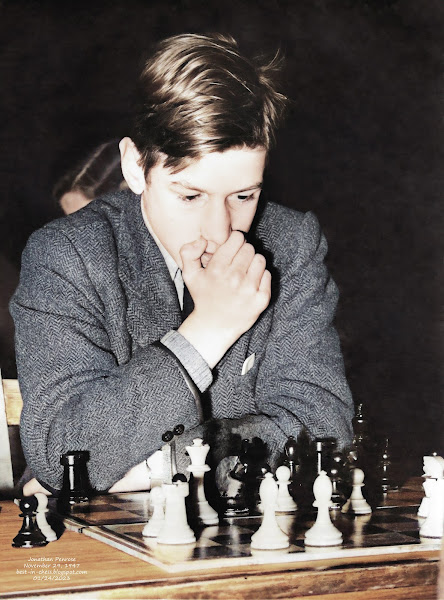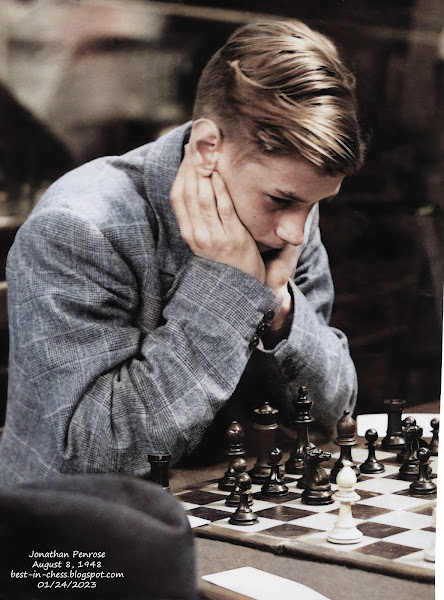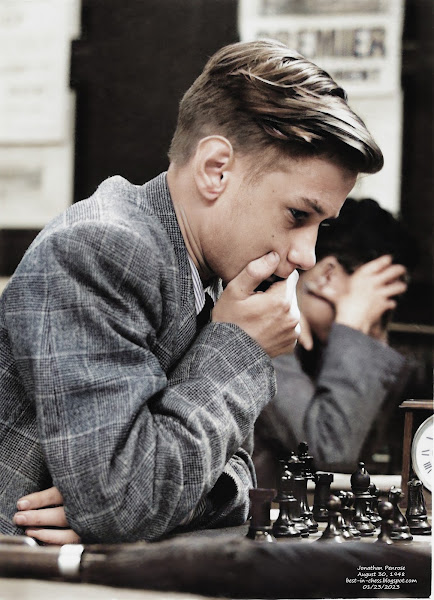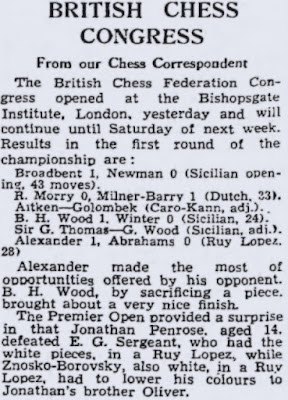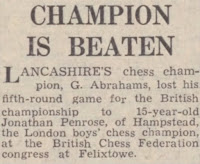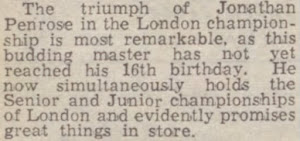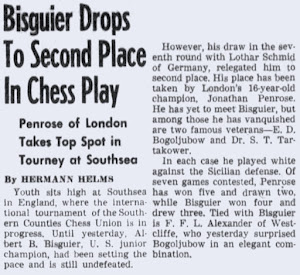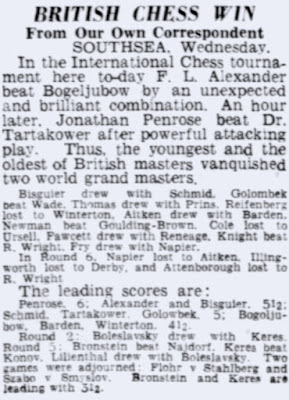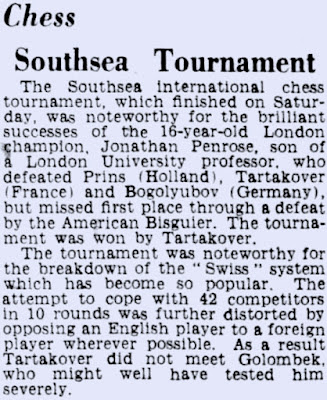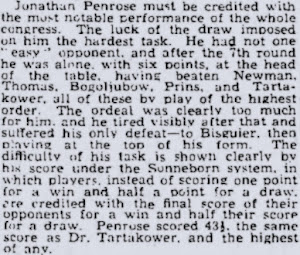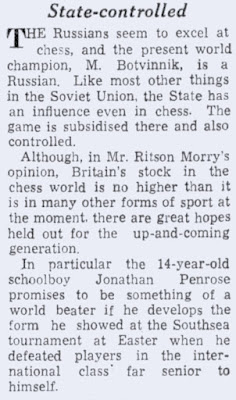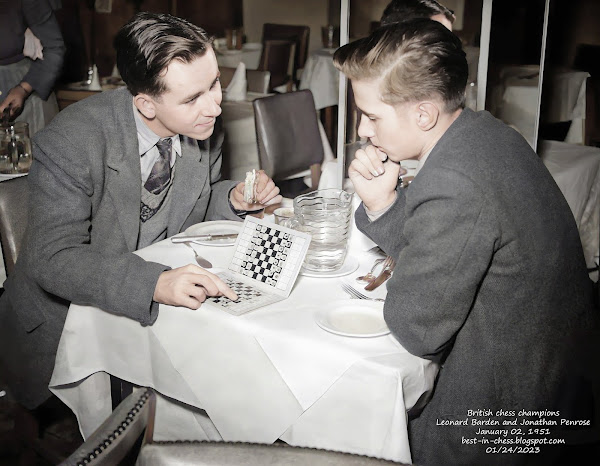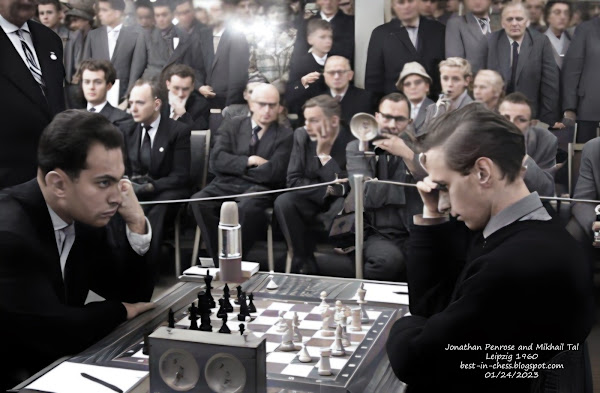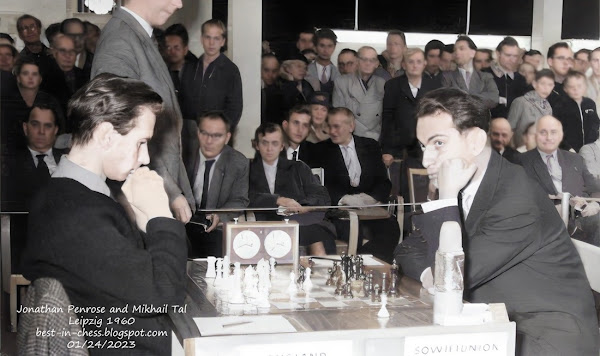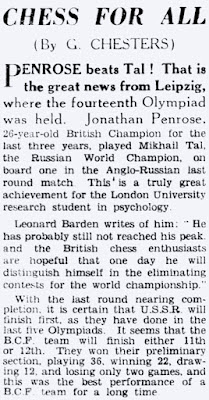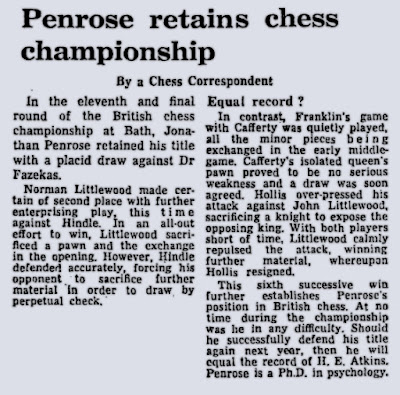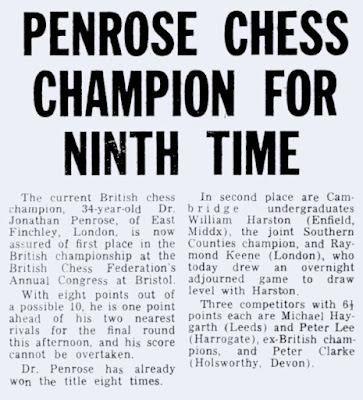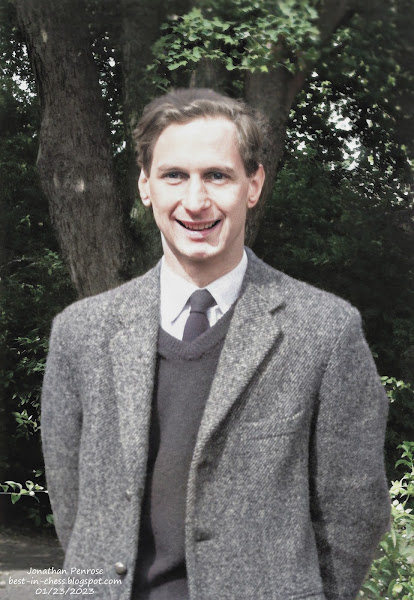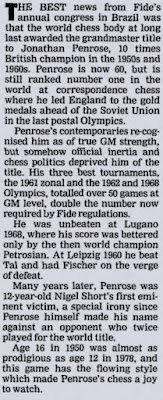Additional Games
Jonathan Penrose
October 07, 1933 - November 30, 2021
The Guardian, London, Greater London, England, Monday, May 05, 1947
BRITISH BOYS' CHESS
From a Chess Correspondent
The tie match in the British boys' chess championship, which decided what probably was the strongest tournament of this kind ever held, was won by Jonathan Penrose (Unity College School, London). He beat L. W. Barden (Whitgift School, Croydon), in a strenuous match which produced excellent chess. Barden started well by winning the first game of the match. He lost the second, and the third was drawn. The decision came in the fourth, a game of outstanding interest.
Barden, on the strength of some fine performances in senior competitions, was generally expected to win. Penrose showed that, besides the knowledge that can be acquired, he also has that intangible something of which masters are made, and as he was born in 1934 there is justifiable hope that he may go far.
November 29 1947
September 02 1948
August 08 1948
August 30 1948
August 31 1948
The Guardian, London, Greater London, England, Tuesday, August 31, 1948
BRITISH CHESS CONGRESS
From our Chess Correspondent
The British Chess Federation Congress opened at the Bishopsgate Institute, London, yesterday and will continue until Saturday of next week. Results in the first round of the championship are:
Broadbent 1, Newman 0 (Sicilian opening, 43 moves).
R. Morry 0, Milner-Barry 1 (Dutch, 33).
Aitken-Golombek (Caro-Kann, adj.).
B. H. Wood 1, Winter 0 (Sicilian, 24).
Sir G. Thomas-G. Wood (Sicilian, adj.)
Alexander 1, Abrahams 0 (Ruy Lopez, 28)
Alexander made the most of opportunities offered by his opponent. B. H. Wood, by sacrificing a piece, brought about a very nice finish.
The Premier Open provided a surprise in that Jonathan Penrose, aged 14, defeated, E. G. Sergeant, who had the Znosko-Borovsky, also white, in a Ruy Lopez, had to lower his colours to Jonathan's brother Oliver.
September 06 1948
Daily Herald, London, London, England, Monday, September 06, 1948
Boy masters
APART from the surprising come-back of Sir George Thomas, the sensation of the British chess tournament in London has been the play of two young brothers — Oliver and Jonathan Penrose.
They are leading the Premier Section, which is next to the Championship Section. Oliver is 18, Jonathan 14.
They have beaten masters and champions so far.
Frank Chetwynd, secretary of the British Chess Federation, tells me that the only reason why the Penrose brothers were not entered for the championship was that their father, Professor L. S. Penrose, of London University, a chess veteran himself, did not want to “push them too fast.”
Young prodigies often become champions at chess. Mikhail Botvinnik, present world champion, won a game from Capablanca at 14.
August 13 1949
Manchester Evening News, Manchester, Greater Manchester, England, Saturday, August 13, 1949
CHAMPION IS BEATEN
LANCASHIRE'S chess champion, G. Abrahams, lost his fifth-round game for the British championship to 15-year-old Jonathan Penrose, of Hampstead, the London boys' chess champion, at the British Chess Federation congress at Felixtowe.
November 01 1949
Manchester Evening News, Manchester, Greater Manchester, England, Tuesday, November 01, 1949
The triumph of Jonathan Penrose in the London championship is most remarkable, as this budding master has not yet reached his 16th birthday. He now simultaneously holds the Senior and Junior championships of London and evidently promises great things in store.
April 15 1950
The Daily Telegraph, London, Greater London, England, Saturday, April 15, 1950
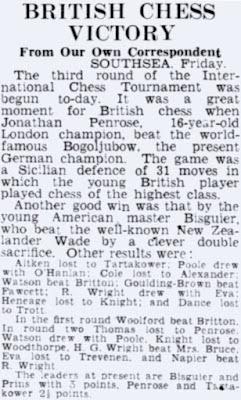
BRITISH CHESS VICTORY
From Our Own Correspondent
SOUTHSEA, Friday.
The third round of the International Chess Tournament was begun to-day. It was a great moment for British chess when Jonathan Penrose, 16-year-old London champion beat the world-famous Bogoljubov, the present German champion. The game was a Sicilian defence of 31 moves in which the young British player played chess of the highest class.
Another good win was that by the young American master Bisguier who beat the well-known New Zealander Wade by a clever double sacrifice.
Other results were:
Aitken lost to Tartakower; Pool drew with O'Hanlan; Cole lost to Alexander; Watson beat Britton; Goulding-Brown beat Fawcett; R. Wright drew with Eva; Heneage lost to Knight; and Dance lost to Trott.
In the first round Woolford beat Britton. In round two Thomas lost to Penrose. Watch drew with Poole, Knight lost to Woodthorpe, H. G. Wright beat Mrs. Bruce, Eva lost to Trevenen, and Napier beat R. Wright.
The leaders at present are Bisguier and Prins with 3 points, Penrose and Tartakower 2½ points.
April 20 1950
The Brooklyn Daily Eagle, Brooklyn, New York, Thursday, April 20, 1950
Bisguier Drops To Second Place In Chess Play
Penrose of London Takes Top Spot in Tourney at Southsea
by Hermann Helms
Youth sits high at Southsea in England, where the international tournament of the Southern Counties Chess Union is in progress. Until yesterday, Arthur B. Bisguier, U.S. junior champion, had been setting the pace and is still undefeated.
However, his draw in the seventh round with Lothar Schmid of Germany, relegated him to second place. His place has been taken by London's 16-year-old champion, Jonathan Penrose. He has yet to meet Bisguier, but among those he has vanquished are two famous veterans—E. D. Bogoljubov and Dr. S. T. Tartakower.
In each case he played white against the Sicilian defense. Of seven games contested, Penrose has won five and drawn two, while Bisguier won four and drew three. Tied with Bisguier is F. F. L. Alexander of Westcliffe, who yesterday surprised Bogoljubov in an elegant combination.
The Daily Telegraph, London, Greater London, England, Thursday, April 20, 1950
BRITISH CHESS WIN
From Our Own Correspondent
SOUTHSEA, Wednesday.
In the International Chess tournament here to-day F. L. Alexander beat Bogoljubov by an unexpected and brilliant combination. An hour later Jonathan Penrose beat Dr. Tartakower after powerful attacking play. Thus the youngest and the oldest of British masters vanquished two world grand masters.
Bisguier drew with Schmid. Golombek best Wade. Thomas drew with Prins. Reifenberg lost to Winterton. Anker drew with Barden. Newman beat Goulding-Brown. Cole lost to Ursell. Fawcett drew with Reneage. Knight beat R. Wright, Fry drew with Napier.
In Round 6, Napier lost to Aitken, Illingworth lost to Derby, and Attenborough lost to R. Wright.
The leading scores are:
Penrose 6: Alexander and Bisguier, 5½; Schmid, Tartakower, Golombek, 5; Bogoljubov, Barden, Winterton, 4½.
Round 2: Boleslavsky drew with Keres.
Round 5: Bronstein beat Najdorf, Keres beat Konov, Lilienthal drew with Boleslavsky Two games were adjourned: Flohr v Stahlberg and Szabo v Smyslov. Bronstein and Keres are leading with 3½.
April 24 1950
Birmingham Post, Birmingham, West Midlands, England, Monday, April 24, 1950
Chess: Southsea Tournament
The Southsea international chess tournament which finished on Saturday was noteworthy for the brilliant successes of the 16-year-old London champion Jonathan Penrose son of a London University professor who defeated Prins (Holland), Tartakover (France) and Bogoljubov (Germany), but missed first place through a defeat by the American Bisguier. The tournament was won by Tartakower.
The tournament was noteworthy for the breakdown of the “Swiss” system which has become so popular. The attempt to cope with 42 competitors in 10 rounds was further distorted by opposing an English player to a foreign player wherever possible. As a result Tartakover did not meet Golombek who might well have tested him severely.
April 27, 1950
The Guardian, London, Greater London, England, Thursday, April 27, 1950
Congress Reflections. Jonathan Penrose must be credited with the most notable performance of the whole congress. The luck of the draw imposed on him the hardest task. He had not one “easy” opponent, and after the 7th round he was alone, with six points, at the head of the table, having beaten Newman, Thomas, Bogoljubov, Prins and Tartakower, all of these by play of the highest order. The ordeal was clearly too much for him, and he tired visibly after that and suffered his only defeat—to Bisguier, then playing at the top of his form. The difficulty of his task is shown clearly by his score under the Sonneborn system, in which players, instead of scoring one point for a win and half a point for a draw, are credited with the final score of their opponents for a win and half their score for a draw. Penrose scored 43½, the same score as Dr. Tartakower, and the highest of any.
July 28 1950
South Wales Echo and Evening Express, Cardiff, South Glamorgan, Wales, Friday, July 28, 1950
State-controlled
THE Russians seem to excel at chess and the present world champion M. Botvinnik is a Russian. Like most other things in the Soviet Union the State has an influence even in chess. The game is subsidised there and also controlled.
Although, in Mr. Ritson Morry’s opinion, Britain's stock in the chess world is no higher than it is in many other forms of sport at the moment. there are great hopes held out for the up-and-coming generation.
In particular the 14-year-old schoolboy Jonathan Penrose promises to be something of a world beater if he develops the form he showed at the Southsea tournament at Easter when he defeated players in the international class far senior to himself.
January 02 1951
January 05 1953
The Daily Telegraph, London, Greater London, England, Monday, January 05, 1953
PENROSE'S CHESS LEAD
From Our Own Correspondent
HASTINGS, Sunday.
Two of the youngest competitors were in the lead at the end of the fifth round of the Hastings International Chess Congress.
Penrose consolidated his lead by defeating his nearest rival, Blau (Switzerland), Medina (Spain) moved into second place by beating Golombek.
The play of Penrose undefeated at the tournament's half-way stage, is the feature of the congress. Results:
Adjourned games: Fairhurst drew with Golombek and beat Yanofsky (Canada).
Fifth round: Penrose beat Blau. Medina beat Golombek. Lasker (U.S) beat Tylor (G.B.), Fairhurst drew with Wade, Seitz (Italy)-Yanofsky adjourned.
Latest positions: Penrose 4½, Medina 3½, Blau and Golombek 3, Fairhurst 2½, Lasker and Wade 2, Yanofsky and Tylor 1½,, Seitz ½.
1960
November 08 1960
November 19 1960
Nantwich Chronicle, Nantwich, Cheshire, England, Saturday, November 19, 1960
CHESS FOR ALL By G. CHESTERS
PENROSE beats Tal! That is the great news from Leipzig where the fourteenth Olympiad was held. Jonathan Penrose 28-year-old British Champion for the last three years played Mikhail Tal the Russian World Champion on board one in the Anglo-Russian last round match. This is a truly great achievement for the London University research student in psychology.
Leonard Barden writes of him: “He has probably still not reached his peak and the British chess enthusiasts are hopeful that one day he will distinguish himself in the eliminating contests for the world championship.&Rdquo;
With the last round nearing completion it is certain that U.S.S.R. will finish first as they have done in the last five Olympiads. It seems that the B.C.F. team will finish either 11th or 12th. They won their preliminary section playing 36, winning 22, drawing 12, and losing only two games, and this was the best performance of a B.C.F. team for a long time.
August 25 1962
The Daily Telegraph, London, Greater London, England, Saturday, August 25, 1962
PENROSE CHESS CHAMPION
5th SUCCESSIVE WIN
Jonathan Penrose has won the British chess championship for the fifth time in succession. He made sure of at least sharing the first place with a 15-move draw with R. G. Wade in the final round at Whitby yesterday.
P. H. Clarke could then have equalled him by beating M. J. Haygarth but on move 32 had to concede a draw acknowledging that he had no winning chances whatever.
J. E. Littlewood beat G. Abrahams in a 24-move game of great brilliance.
Mrs. R. M. Bruce (Plymouth) is again British lady champion. She has previously won the championship six times outright and shared it on another occasion.
August 24 1963
The Guardian, London, Greater London, England, Saturday, August 24, 1963
Penrose retains chess championship
By a Chess Correspondent
In the eleventh and final round of the British chess championship at Bath, Jonathan Penrose retained his title with a placid draw against Dr Fazekas.
Norman Littlewood made certain of second place with further enterprising play, this time against Hindle. In an all-out effort to win, Littlewood sacrificed a pawn and the exchange in the opening. However, Hindle defended accurately, forcing his opponent, to sacrifice further material in order to draw, by perpetual check.
Equal record?
In contrast, Franklin's game with Cafferty was quietly played, all the minor pieces being exchanged in the early middle-game. Cafferty's isolated queen's pawn proved to be no serious weakness and a draw was soon agreed. Hollis over-pressed his attack against John Littlewood, sacrificing a knight to expose the opposing king. With both players short of time, Littlewood calmly repulsed the attack, winning further material, whereupon Hollis resigned.
This sixth successive win further establishes Penrose's position in British chess. At no time during the championship was he in any difficulty. Should he successfully defend his title again next year, then he will equal the record of H. E. Atkins. Penrose is a Ph.D. in psychology.
August 16 1968
Evening Post, Bristol, Avon, England, Friday, August 16, 1968
PENROSE CHESS CHAMPION FOR NINTH TIME
The current British chess champion 34-year-old Dr Jonathan Penrose of East Finchley London is now assured of first place in the British championship at the British Chess Federation's Annual Congress at Bristol.
With eight points out of a possible 10 he is one point ahead of his two nearest rivals for the final round this afternoon and his score cannot be overtaken.
Dr. Penrose has already won the title eight times.
In second place are Cambridge undergraduates William Harston (Enfield, Middx) the joint Southern Counties champion and Raymond Keene (London), who today drew an overnight adjourned game to draw level with Harston.
Three competitors with 6½ points each are Michael Haygarth (Leeds) and Peter Lee (Harrogate), ex-British champions and Peter Clarke (Holsworthy, Devon).
December 11 1993
The Guardian, London, Greater London, England · Saturday, December 11, 1993
Penrose Awarded Grandmaster Title
THE BEST news from Fide's annual congress in Brazil was that the world chess body at long last awarded the grandmaster title to Jonathan Penrose, 10 times British champion in the 1950s and 1960s. Penrose is now 60, but is still ranked number one in the world at correspondence chess where he led England to the gold medals ahead of the Soviet Union in the last postal Olympics.
Penrose's contemporaries recognized him as of true GM strength, but somehow official inertia and chess politics deprived him of the title. His three best tournaments, the 1961 zonal and the 1962 and 1968 Olympics, totalled over 50 games at GM level, double the number now required by Fide regulations.
He was unbeaten at Lugano 1968, where his score was bettered only by the then world champion Petrosian. At Leipzig 1960 he beat Tal and had Fischer on the verge of defeat.
Many years later, Penrose was 12-year-old Nigel Short's first eminent victim, a special irony since Penrose himself made his name against an opponent who twice played for the world title.
Age 16 in 1950 was almost as prodigious as age 12 in 1978, and this game has the flowing style which made Penrose's chess a joy to watch.












